Peter MALONE
Saturday, 18 September 2021 19:59
Ridicule
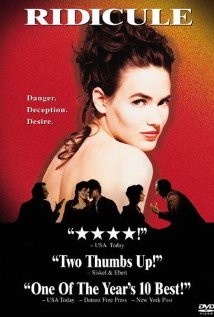
RIDICULE
France, 1996, 102 minutes, Colour.
Charles Berling, Jean Rochefort, Fanny Ardant, Judith Godreche, Bernard Girardeau, Carlo Brandt, Vincent Lindon, Albert Delpy, Dominic Pinon.
Directed by Patrice Leconte.
Ridicule was the official French entry for the Foreign Language category for the Oscars. It opened the Cannes Film Festival, 1996. It was directed by Patrice Leconte who made Monsieur Hire and The Hairdresser's Husband and stars, Fanny Ardant, Charles Berling and Jean Rochefort.
The setting is France. The time is 1780. It is the period of Dangerous Liaisons and the two films are related in tone and theme. Louis XVI and Marie Antoinette are king and queen of France but, in just over a decade, they will have been executed and the French Revolution will have destroyed the ancien regime. It is an age of decline, even decadence.
The film's title, Ridicule, is best translated as `witty mockery'. And ridicule is the fashion at court and the criterion for moral (or amoral) judgment. Voltaire is dead, but the heritage of mordant wit has become part of the way of life - but, without the intelligence and philosophy that marked Voltaire's writing.
The exercise of ridicule means that the criteria for judgments (in all senses) are to be objective: the innate logic of words and their meaning, the application of logic, the complete disregard of an individual's personal feelings. Ridicule has also become a game, played at dinner tables or in the salons of the intelligentsia, where there is deliberate disregard for personal feelings, with contempt for the victims of the ridicule.
Intuition has to be the other characteristic of ridicule. At one stage, a list of categories of wit is offered. The word-play and the ideas-play are the centre of wit and transformed into weapons of ridicule.
The type of the culture in this pre-revolutionary aristocratic France is `intuitive-thinking'. Its manifestation in society means that the expectations are that the wit be extraverted. And, with the leisure of the wealthy classes, there is no urgency to reach conclusions. One stays with and relishes the wit and the impact of the ridicule.
It makes quite some impact in the film because the central character, a country hydrographer with plans to drain the Dombes' swamps of France, goes to Versailles to make a case for royal support of his project. He finds that the court has no interest in his petition, no interest in truth. Rather, he has to spend time idly waiting, but also developing word skills and cruelty to get the King's attention. He does. But then the film reprises the theme, `What does it profit to gain the whole world and lose one's soul?'.
It should be said that the film is sumptuous in sets, decor and costumes as well as beautiful in its photography. We are transported into another world. However, it is not just a pretty period piece. It is a portrait, a critical portrait of a decadent society that needs to be overthrown.
Stephen Frears' Dangerous Liaisons might have been titled `Ridicule and Seduction'. We see the same cruelty, but the focus is more on the individuals and their exercise of power. Glenn Close's Madame de Merteuil is the mistress of these power games and control.
It should be said that, while wit can be a strong characteristic but, when the wit is an abuse of power in ridicule, the culture is not exhibiting the qualities, but is trapped, destructively.
1. The title? In French? In English? Wit? Mockery? Esprit?
2. An 18th century story, France, the monarchy, the 17th and 18th centuries and the rulers, the luxury, manners and morals, buildings, extravagance? Leading to the uprising, and the French revolution and the death of the King of the Queen?
3. Costumes, decor, Versailles? The contrast with the swamp lands? Homes, court? The musical score and the music of the period?
4. Wit, mordant wit, cruelty, mockery, humour, use of power, acquiring status and prestige?
5. The opening, the Chevalier, the old man, the reminiscences about the past, ridicule and humiliation, the urination? Setting the tone?
6. Dombes, the swamp lands, Gregory, Baron, his engineering skills, his care for people, his motivation to drain the swamp, the intention to go to court, travelling, his being robbed? Been taken in by the doctor? The doctor, a minor noble, his medical skills, his use of wit?
7. French society, Gregory as the target, the physician coaching him, improving, Madame and her relationship with the abbe, the sexual relationship, cheating at cards? Gregory, the death of his sponsor, the widow, his deciding that he would not reveal the cheating, the process and progress of his project?
8. The court, Louis XVI and Marie Antoinette, pomp, corruption?
9. The episode with the shoe, the abbe, the noble falling asleep, the removal of his shoe, in the fire, his being woken, his humiliation at not having his shoe, the requirement to have all clothes for an audience with the King? His suicide?
10. Mathilde, the doctor’s daughter, arranged marriage, wealth, her interest in fostering her science experiments, paying her father’s debts? Working with Gregory, the attraction, the issue of money, his not wanting to stand in her way?
11. Paul, the episode of the deaf mute, court?
12. The dinner, Madame and her revenge, the joust of wit and ridicule, the wit, elimination of the guest because of no extra places? The atmosphere of the dinner?
13. The abbe, his blasphemy at court, his fall? Madame, focusing on Gregory, the sexual relationship, manipulation, arranging so that the doctor and Mathilde should learn about the relationship?
14. The deaf at court, the abbe teaching them, the court and the mockery, some interested in the sign language, – even wit?
15. At court, Gregory and his being taken into the king’s entourage, the issue of the canon, his engineering suggestions, the reaction of the canon engineer, the challenge to a duel, the warning against it, Gregory participating, the death of the canon engineer? The King’s not being able to receive him so soon after the death in the duel, yet affirming his honour?
16. Madame, still wanting revenge, the masked ball, Gregory, his tripping, the mockery and ‘Antipodes’? His leaving with Mathilde, defying the group, denouncing corruption, Madame and her tears?
17. The revolution, Gregory and Mathilde living in France, achieving the draining of the swamp – and her father going to Dover, and the discovery of English humour?
Published in Movie Reviews
Published in
Movie Reviews
Tagged under
Saturday, 18 September 2021 19:59
Playing it Cool
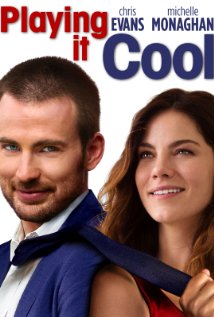
PLAYING IT COOL
US, 2014, 94 minutes, Colour.
Chris Evans, Michele Monaghan, Topher Grace, Aubrey Plaza, Luke Wilson, Martin Starr, Anthony Mackie, Ioan Gruffud, Philip Baker Hall, Patrick Warburton.
Directed by Justin Reardon.
Playing it Cool is a slight romantic comedy starring Chris Evans at the time he was being Captain America on screen. He is a screenwriter, working with his agent, Anthony Mackie (who also appeared in the Captain America films). Evans wants to write an action film but his agent says the studios want a comedy. The plot involving him, his group of writer friends who have plenty of advice for him, is obviously the romantic comedy that he has to write.
He goes to a fundraiser and sees the girl of extremes, Michelle Monaghan. With the help of his gay friend, Topher Grace (who has a thing for James Cameron films and thinks The Terminator is more romantic than Titanic), he goes to every charity function until he finds the girl of his dreams. He has posed as a great benefactor of charities but it is unmasked – but, of course, he is really in love, and she forgives him.
1. A romantic comedy about a romantic comedy?
2. The San Francisco settings, homes and apartments, restaurants, charity functions, the water and the beach? Atmosphere? The musical score?
3. The screenwriter and his story, voice-over, his dark black-suited and hat alter ego? His creativity, writer’s block, wanting to do an action film, his agent persuading him to do a romantic comedy, his questions about the nature of romance, his imagining different situations, memories of women rejecting him, the discovery of the ideal woman, her presence in his imagination?
4. His background, love for his mother, her note and leaving him, being brought up by his grandfather, his grandfather’s sardonic remarks, urging him to venture out?
5. Meeting Scott, chasing him, Scott leaving behind his favourite book, Love in the time of Cholera, apprehensive, becoming a friend of the writer, the discussions about the romantic nature of Titanic and The Terminator? His friendship with the writer, accompanying him to the charity events, his comments with the other friends?
6. The friends in the group, the introduction, the explanations, their writing, their meetings, discussions, drink, helping the writer, their own personalities, especially Mallory and her hard line, her improvisations, concerts and performances, sexual references? The continued challenge to the writer?
7. The writer and his lack of confidence in himself, saying the wrong thing, his alter ego advising him? The chance encounter with the girl, at the charity, his talking to Scott at the toilet door, invective against women, her hearing him? The conversation, her boyfriend? Her charm?
8. His grandfather urging him to find her, googling, going to all the charities, the charity executive and his inventing all the stories, the executive praising him, at the dinner, his being exposed as a fake? The experience of all the socials?
9. Suddenly finding the girl, her job, organising charities? The impact?
10. His approaches, putting his foot in it, her responses, going for walks, going out, to the art show as a friend date? The night together? Her seeing him as a fake, his disappointment? Her getting married, the ceremony, his chase with the taxi, to all the venues, finding her, not married?
11. Declarations of love, authentic love, the happy ending?
Published in Movie Reviews
Published in
Movie Reviews
Tagged under
Saturday, 18 September 2021 19:59
How to Change the World
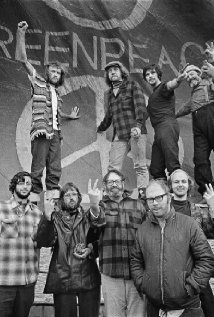
HOW TO CHANGE THE WORLD
US, 2015, 110 minutes, Colour.
Directed by Jerry Rothwell.
This is an award-winning documentary on the origins of Greenpeace. It is valuable in incorporating so much of the footage taken in the 1970s, an anticipation of what would be needed for visual documentation for the future.
The film gives the background for Greenpeace, the environmental movements of the 1970s, the Russian whale hunters and Greenpeace in pursuit of them – again, some very striking footage.
The film is also one of talking heads, and it is interesting to contrast the appearances of the men and women in the 1970s with 40 years later.
Robert Hunter is shown as the founder of Greenpeace, his leadership, his eccentricities, his being ousted from the organisation, his television career and coverage. Also featured is Paul Salmon, who clashed with him, then as well as now, and seeing his career with contemporary attacks on whale hunters.
Of interest is the character of Patrick Moore, internationalising Greenpeace but, later, giving testimony and supporting fossil fuel oil companies.
A film for discussion.
1. The 2015 perspective, the past 40 years, the environmental movement? The title and its tone?
2. Film in the 1970s, preserved, the visuals of the past, the range of footage, used within the context of the film, the framework? Stills? Musical score?
3. The importance of the talking heads and the present, the variety of opinions, with the visuals of the past activity? The characters and their appearances, clothes, styles of the 1970s compared with the present?
4. The inspiration for Greenpeace? Canada, Vancouver, the background, the changes in the 1970s? Idealists? The political atmosphere of the period?
5. Hunter, his personality, ideals, his associates? The initial mission to Alaska? Success in the, the media? The saving of the whales, the boat, the Pacific, pursuing the Russian vessel? The members of the crew, their personalities, various roles? Their ideals? The influence of religions and New Age? The I Ching?
6. The Pacific, the search, the patrols, exercising the I Ching, the planes, finding the vessel after almost giving up, petrol, food, the touch of divination? Bob Hunter and his persistence? The role of the different crewmembers? The photography, the tactics? The harpoonist firing the harpoon, the dangers to the crew? The baby whales, making the measurements? The Russian reaction, the boat,, the blood coming out, the cruelty to the whales? The buses factory?
7. Public support, press television, the variety of stories? Developing Greenpeace? The reactions, different sensibilities and views? The decision to go on protesting, the issue of the seals, using the die, Hunter and his negotiation with the locals, going to the meeting, compromising – and Paul Watson’s anger?
8. The shift to organisation and management, the talking heads, looking at the history and waiting it from the present?
9. Bob Hunter, ideals, a touch of divination? Tension, the valium, the cigarettes? Getting weary? The clashes with Paul Watson? The succession by Patrick Moore? His resignation, regrets?
10. Bob Hunter’s words and spoken by actor, Barry Pepper?
11. Bob Hunter and his television career, writing, contribution to the cause? His illness and death? His family, daughters, keeping up his tradition?
12. The contrast with Paul Watson, his past, later developments, the Sea Shepherd? His aggression, a crusader, clashing with Bob Hunter, the issue of the seals, the die, his being injured? Clashing with Patrick Moore – in the past, and his caustic comments in the present? The issue of the seals, against compromise, his own injuries, the helicopter? The reconciliation with Bob Hunter, television programmes? Hunter’s daughter?
13. Patrick Moore, his role, ideas, the organisation in Vancouver, internationalising the organisation? The clashes, with Paul Watson, resignation? His present observations? His later behaviour, companies, his denial of global warming, his behaviour in 2014?
14. The women, few, in a male atmosphere? Public opinion?
15. Photographers, the use of radio, radio and the contrast between then and now?
16. Intentions, doing good, the issue of money, the role of David MacTaggart? and the International Organisation? Adapting to new ideas, times, new technology, the media?
17. The picture of a movement which became an organisation, structure and management, financial issues, the clashes of egos? Issues of the time, autonomy, federation, human resources?
18. The contemporary presence and influence of Greenpeace?
Published in Movie Reviews
Published in
Movie Reviews
Tagged under
Saturday, 18 September 2021 19:59
Omkara
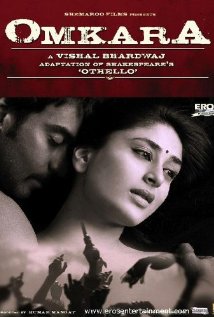
OMKARA
India, 2006, 155 minutes, Colour.
Ajay Devgn, Kareena Kapoor, Saif Ali Khan.
Directed by Vishal Bharadwa.
Bollywood movies are still rare enough outside India and cinemas around the world catering for Indian audiences. They have more than a touch of the exotic for Western audiences.
Here is an interesting bridge-builder between cultures.
Omkara is an enforcer in an Indian state, helping an imprisoned leader be elected to government. He has his own militia and they are not afraid to take things into their own hands. Dolly, the daughter of a powerful businessman has eloped with Omkara, whom the businessman despises as being of lower caste. He warns Omkara that, since his daughter had deceived him, she could deceive Omkara. Omkara also passes over his lieutenant, Langda, to promote the younger Kesu. Langda conceals his disappointment but takes the opportunity to make the reformed Kesu drunk. Dolly begins to plead Kesu’s cause and Langda capitalises on this. Langda’s wife steals a jewelled heirloom that Omkara gave to Dolly. Langda steals it, gives it to Kesu who gives it to his love, Billo. The suspicious Omkara is consumed by jealousy and smothers Dolly.
Yes, it is the plot of Othello.
The film illustrates just how strong the plot of Othello is and how well it can transfer to another culture without the majesty of Shakespeare’s verse.
For those not familiar with Othello, Omkara will be an intriguing character study and a glimpse into Indian politics, corruption and violence. For those who know the play, looking at how the plot has been so closely adapted adds to the pleasure of the drama – with the names suggesting Shakespeare’s characters’ names.
While there is a certain old world atmosphere about this violent world, it is also a world of constant mobile phone contact – and Kesu (Cassio) teaches Dolly (Desdemona) a song during Omkara’s absence: ‘I just called to say I love you’! So mobile phones and Stevie Wonder give it a modern exotic touch.
Long, colourful and intriguing.
Published in Movie Reviews
Published in
Movie Reviews
Tagged under
Saturday, 18 September 2021 19:59
Date with the Falcon
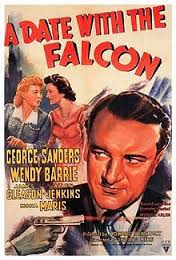
A DATE WITH THE FALCON
US, 1942, 65 minutes, Black and white.
George Sanders, Wendy Barrie, James Gleason, Allen Jenkins, Mona Maris.
Directed by Irving Reis.
A Date with the Falcon is one of four films with George Sanders starring as Gay Lawrence, the detective who lives the Playboy life, is always under suspicion by the police, always has his eye on attractive women, and, with seeming ease, solves all the cases that the police cannot.
The issue behind this story is that of the making of artificial diamonds cheaply, possible for use in industrial situations, especially for weapons. However, there are always criminal elements eager to get their hands on such diamonds and sell them.
Gay Lawrence is about to go off on a trip with his fiancee, Helen, Wendy Barrie. She spends most of the film upset, jealous, angry, because of the continued disappearances of her fiance and his seemingly poor excuses, especially where women are concerned. Also on hand is Lawrence’s assistant, Goldy, played by Allen Jenkins, always available to take on odd jobs. Then there is the police Inspector, Mike O’Hara?, James Gleason, friend of the Falcon, yet, it seems, unwarrantedly suspicious of him for robberies and murder, continually exasperated by his assistants, having finally to admit that the Falcon was able to solve the case.
The case involves the abducting of the manufacturer of the diamonds, a faked telegram urging him to meet his twin brother and the murder of the brother which is assumed to be the murder of the manufacturer. In the meantime, there is a femme fatale who wants the Falcon onside (Mona Maris) and various criminal colleagues, the Falcon ultimately making her suspicious of her boss and her killing him. There are also different abductions of the Falcon himself, one which is amusing as, stuck in the back of the criminal’s car with the gun at his side, he pokes faces at the passing police, carries on as if he is drunk, and makes them stop the car so that he makes his getaway.
In the other chase, he sets up Helen, the criminals pursue her, Goldy follows them, stops the criminals in the street but is accused of being drunk, and with the Falcon captured, his twisting the femme fatale’s motives, but ultimately setting the police on the criminals who are all arrested. Case closed, off with his fiancee – to the next film.
Published in Movie Reviews
Published in
Movie Reviews
Tagged under
Saturday, 18 September 2021 19:59
Rich are Always with Us
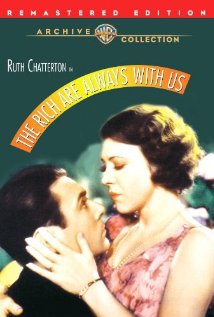
THE RICH ARE ALWAYS WITH US
US, 1932, 71 minutes, Black and white.
Ruth Chatterton, George Brent, Bette Davis, John Miljan, Adrienne Dore.
Directed by Alfred E.Green.
This is an early sound melodrama, which, with its elaborate title, actually promises more than it delivers.
The opening, 1900, announces the birth of the leading lady, Caroline (Ruth Chatterton). Then the caption, 1920, indicates that she has inherited a great deal of money. Then, 1930, when she marries Greg – a society marriage, which only a few years later is on the rocks.
Ruth Chatterton was popular in films at this time. John Miljan is her husband, already flirting with a young woman and intending to divorce and remarry. Also in the picture is George Brent in an early role, a novelist, in love with the wealthy woman. Rounding out the picture is a young Bette Davis, with the name Malbro (and many wonder where screenwriters dug up these names), friend of Caroline and in love with the novelist.
A lot of the film is taken up with discussions, Greg with his new girlfriend and her petulant response to his wife, confrontation with his wife and the girlfriend, Malbro turning up now and again involved in flirtatious and threatening discussions, and the novelist with Caroline, at meals, alone with her, proposing.
Ultimately, Caroline travels to France in order to get a divorce. The novelist decides to follow her to France and does so. Malbro tries to intervene and stop him.
When the husband becomes ill, Caroline returns from France, the novelist thinking that she wants to go back to her husband – but the finale of the film is her calling on a Justice of the peace, a hasty wedding ceremony with the novelist, reassuring him that he loves her and she loves him and they have a future together.
One for the history of Hollywood movies.
Published in Movie Reviews
Published in
Movie Reviews
Tagged under
Saturday, 18 September 2021 19:59
Bon Voyage, Charlie Brown, and don't come back
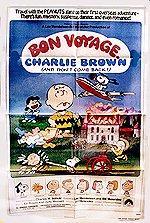
BON VOYAGE, CHARLIE BROWN (AND DON’T COME BACK)
US, 1980, 71 minutes, Colour.
Voices of: Arrin Skelly, Laura Planting, Daniel Anderson, Bill Melendez.
Directed by Bill Melendez, Phil Roman.
Already in 1969 there was a film about Charlie Brown and his friends, A Boy Named Charlie Brown. Following that, in the early 70s, there was Snoopy Come Home and, and with further success, Race For Your Life, Charlie Brown in 1977. This film was the follow-up – although there were a number of television specials. in 2015, Charles Schulz’s son and grandson produced The Peanuts Movie, gathering together all the best aspects of the comic strips and the previous films, very popular at a box-office success.
This adventure, directed by Bill Melendez (who supplied the sounds for both Snoopy and Woodstock) with Phil Roman, who made Race for Your Life, Charlie Brown, makes several advances in the storytelling. The first is that there are some adult characters who use their own voices whereas previously there was a trombone kind of sound indicating adults, especially teachers and their booming. This film also takes the group to Europe.
The idea is a program for exchange students and Charlie Brown and the others going to France, the trip, experiencing cultural differences, some mishaps with Charlie Brown, of course, with Snoopy and Woodstock in tow, and a mysterious Castle in France, Baron, his niece and dark secrets.
Entertaining like the other films – but taking the cartoon a bit further, outside the US, and with adults.
1. The popularity of the comic strips by Charles Schulz, the film versions, television specials?
2. The nature of the comic strips, drawing, characters, backgrounds? The same style transferred to animation? The musical score?
3. The animation, delineation of the characters, situations, bright colours? United States, France, Europe?
4. The familiarity of the characters, Charlie Brown, quiet, self-image, down on himself? Lucy and her criticisms? Linus, his blanket, friendship? Marcie and the other children? Snoopy, his expressions, communication? Woodstock?
5. Introduction of adult characters, with adult voices?
6. The idea of the exchange students, Charlie Brown and friends going to Europe? Going to France? American experience in Europe? The comic touches? Cultural differences?
7. The trip, Lucy’s farewell, Charlie Brown and the others and their coping?
8. France, the mysterious castle, secret, the Baron, his niece? The characters and their involvement? The revelation of the secret?
9. A step further in the story of Charlie Brown, from home, from America, into the outside world and Europe?
Published in Movie Reviews
Published in
Movie Reviews
Tagged under
Saturday, 18 September 2021 19:59
Child of God
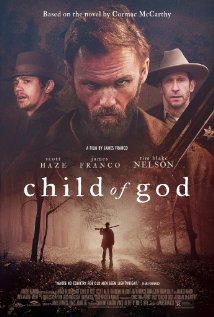
CHILD OF GOD
US, 2013, 104 minutes, Colour.
Scott Haze, Tim Blake Nelson, Jim Parrack, James Franco, Vince Jolivette.
Directed by James Franco.
The first thing to note is that this is a film based on a novel by Cormac Mc Carthy. The celebrated novelist has had several film versions of his books, All the Pretty Horses, directed by Billy Bob Thornton, No Country for Old Men, the Oscar-winner from the Coen Brothers and The Road, directed by John Hillcoat.
This time the film is co-written and directed by James Franco, who has become prolific as novel writer, screenwriter and director as well as performing in most of his films. He has a cameo role in this film as the leader of a posse to track down the central character, Lester Ballard. He is played by Scott Haze in an intense performance, a loner, touches of madness, antisocial, with unbalanced sexual proclivities, yet very shrewd in surviving. Tim Blake Nelson plays the local Sheriff and Jim Parrack his deputy.
This is very grim backwoods film, focusing on Ballard, his character, his psyche, his behaviour, townspeople against him, the pressures from the sheriff and his assistant, his assaulting women, shooting, scalping, necrophilia.
A film showing the effects of the inbred life in the American mountains and a grim world from Cormac Mc Carthy.
1. The impact of the film? Grim? The total, the ironies, Lester Ballard and his relationship with good and evil? God?
2. The work of Cormack Mc Carthy? His novels? Film adaptations? The Mc Carthy perspective, America, the backwards, community, individuals, harshness, righteousness and violence?
3. The locations, the mountains, the countryside, the fields, the open spaces, caves? The hut? The detail? Offices? Musical score?
4. The tone, grim, narration, the chapters and headings?
5. Lester Ballard and his character, the performance by Scott Haze? Explanations, wild man, alone, his house, coming in from the country, his reaction to the auction, the attack, claiming it was his property, the authorities claiming it was not? Threatening with the gun, his being hit on the head? His house? The mattress, harsh life, shooting the animals, the cow, stealing the hen?
6. Seeing the woman, her having been attacked, his dealings with her, her reaction? The arrest, the woman denouncing him, imprisonment, the African- American prisoner, his words, singing? The deputies, the accusation of rape?
7. The character of the deputies, keeping law and order, going into action, confronting Ballard?
8. Ballard and his life, wild, defecating, food, meals, cooking? Spying on people, the couple in the car, watching, masturbation, killing the girl? Taking her to the attic, dressing, the sexual experiences?
9. Audience repugnance at his character, behaviour? Moral judgement?
10. The cars, the inhabitants, the killings?
11. The attack on the woman, the scope, wearing her hair and scalp as a wig, the confrontation at the house, his running away?
12. His arrest, the struggle, his losing his arms, in hospital? His smart remarks?
13. The policy, the confrontation, their wanting to know where the bodies were buried, his leading them to the caves, the following, his escape, crawling through the tunnels, coming into the light and freedom?
14. The humanity and inhumanity of his character? The film?
Published in Movie Reviews
Published in
Movie Reviews
Tagged under
Saturday, 18 September 2021 19:59
Anomalisa
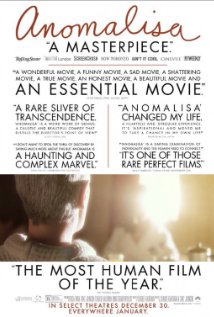
ANOMALISA
US, 2015, 90 minutes, Colour.
Voices of: David Thewliss, Jennifer Jason Leigh, Tom Noonan.
Directed by Duke Johnson, Charlie Kaufman.
It has been pointed out that the title of this film, Anomalisa, is an anagram for a Mona Lisa, giving a clue as to the role of the female character, her presence in the life of Michael Stone, a man suffering from midlife crisis, her enigmatic presence, the magical smile which can transform anyone who watches her.
This is an animation film for adults, not for children. It is a work of Charlie Kaufmann whose films comprise Being John Malkovich, Adaptation, Eternal Sunshine of the Spotless Mind, all films about male identity, crises and self-awareness. This is his first animation venture, in collaboration with Duke Johnson, originally a 40 minute work and voiced for radio by the present cast.
Michael Stone has written books on customer service and travels to a conference where he is to give a paper. He is already nervous on the plane to the city, mixups with the taxi, finding his room in the hotel, and undergoing a personal crisis, making reflect on his life, his wife and family, his work, and the reality of his own personality.
He is voiced by David Thewliss. Jennifer Jason Leigh is the voice of Lisa, with the touch of the mysterious, arousing Michael Stone out of his torpor in many ways. There are quite a number of other characters, male and female, but they are all voiced by Tom Noonan.
By the time Michael Stone comes to give his paper, he becomes bewildered, is in a state of mental and emotional collapse – and certainly in need of some kind of healing.
Critics have been very warm in their praise of Anomalisa and it received a number of nominations for animation. Because it is not the kind of film, story or treatment that most audiences will be expecting, it requires quite a deal of attention, concentrating on the character of Michael Stone and reflection on the issues.
1. Acclaim for the film, story, characters, animation style?
2. The story in characters, male midlife crisis?
3. The story as told in animation? How effective? In comparison with a more realistic approach with actors? The credibility? Audience accepting the devices?
4. The animation, stop-motion, stylised, comparisons with the realism approach? Layouts, the plane, airport, taxi ride, hotel, the room, interiors, corridors, basement, home? An authentic feel?
5. The colour palette, the humans, stylised? Jaws and masks, coming off in the night?
6. Everything from Michael Stone’s point of view, his trip, the memories of Lisa, the talk on the plane, the man holding his hand, arrival at the airport, the taxi, smoking and the driver’s asthma sign, the hotel, the request for the quiet room with smoking, the room, shower, room service, phone call to his wife and son, the plan to buy the toy, the sex shop – different toys, buying the Japanese mechanism, going to the conference, his talk, the publication of his book, Customer Service?
7. The night, the encounter with Belle, the past relationship, the collapse of the relationship, his rejection? At the hotel, the rooms and confusion, upset, the search, finding Emily and Lisa, the talk, the drink with Lisa, the night with her, the effect? His nightmare, the manager sending for him, the vast office space, the manager declaring that he was in love, Michael crossing the desks, all the people saying they were in love? His waking up? Breakfast with Lisa, the proposal, yet irritated by her scrambled eggs and the fork hitting her teeth, the food in her mouth? Lisa willing to go with him?
8. The reality, his being in crisis, his talk at the conference, following his text, going off on monologues, the anti-President outbursts, imitating the soldiers, his being booed? Lisa watching?
9. Lisa, the message, driving, the farewell?
10. Arriving home, the guests, the surprise party, his son and the Japanese doll, the semen, his wife, all the guests, his bewilderment?
11. The audience sharing his crisis – what future?
Published in Movie Reviews
Published in
Movie Reviews
Tagged under
Saturday, 18 September 2021 19:59
My Life So Far
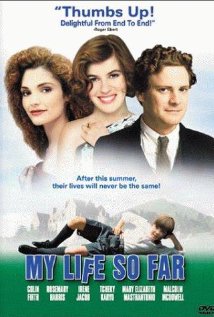
MY LIFE SO FAR
UK, 1999, 98 minutes, Colour.
Colin Firth, Rosemary Harris, Irene Jacob, Mary Elizabeth Mastrantonio, Malcolm Mc Dowell, Robert Norman, Tcheky Karyo, Kelly Macdonald.
Directed by Hugh Hudson.
My Life So Far is based on the autobiography of Sir Denis Norman, later BBC director.
This is a Scottish memoir, taking place in the 1920s, a pleasing look at Scottish life, even if the family is quite eccentric. The film focuses on the young boy, Fraser, played by Robert Norman. his father, an inventor, is played in his usual style by Colin Firth, his wife played by Mary Elizabeth Mastroianni. In the household is the grandmother, Rosemary Harris.
The setting has a post world War one period feel, especially with a French aviator dropping in, played Tcheky Karyo. Then there is also the somewhat scoundrel brother, played in his usual style by Malcolm Mc Dowell, bringing his fiancee, Irene Jacob, with whom the father becomes infatuated.
There are flying sequences, there are invention sequences, there are romantic sequences, and, overall, a pleasing visit to Scotland. Direction is by Hugh Hudson who made a great impact with Chariots of Fire and Greystoke.
1. A Scottish story? True story? The author, his subsequent career, memories?
2. The Scottish setting, the estate, the scenery, the house? The period? The musical score?
3. The title, the focus on Fraser, as a baby, young boy, at the brink of adolescents? His parents? Relatives? And the significance of aunt Heloise?
4. The boy on the roof, his father cage was rescue, everybody’s concern? Growing up? His age during the film, beginnings of puberty?
5. An adventurous boy, his experiences, admiring his father and his inventions, the bond with his mother, grandmother? Curiosity, reading, the discovery of the sex photos and the repercussions? Precocious? The arrival of aunt Eloise and his infatuation?
6. The character of his father, his marriage, the many children, the bonds with them all, his mother-in-law, the inventions, the arrival of uncle Morris, the clashes with him, Morris’s pragmatic, their arguments? The importance of the factory and the production and sales? His infatuation with Eloise, together in the barn, the repercussions for her, repercussions for him, his growing infatuation, his behaviour, his wife’s response, his outbursts, the final confession?
7. His wife, a good woman, her singing career, her place in the family, the range of children, her devotion to Fraser? Details of life at home, managing? Her being hurt by her husband and his infatuation, has strong stance?
8. The grandmother, her children, the estate, the details of the life, her collapsing and Fraser thinking her dead? Her influence? The meal – and the alcohol in the desert and not realising it? Her death and its sadness?
9. Morris, life in the city, the touch of arrogance, his plans of the estate, his dismissing of the factory, his relationship with the workers? Bringing Halloween his to the estate, the age difference, his love? The buildup to the wedding, the ceremony, the honeymoon?
10. The flyer, is landing at the estate, personality, everybody’s fascination, taking Fraser on the plane ride? Elspeth, the attraction, the remains?
11. Louise as a person, her age, attractive, with Morris, the encounter with Edward, the repercussions for her, his infatuation? The interaction with Edwards wife? With Fraser? Sending the gifts?
12. A memoir, happy life, transition in age, writes passage, boy in the family, relationship to each parent, creativity and curiosity – and the subtext with Heloise?
Published in Movie Reviews
Published in
Movie Reviews
Tagged under